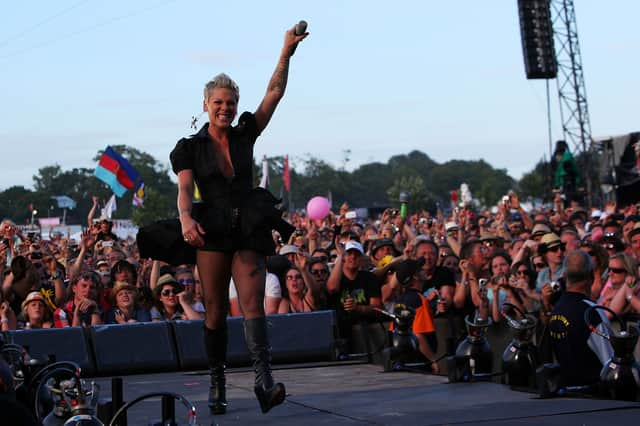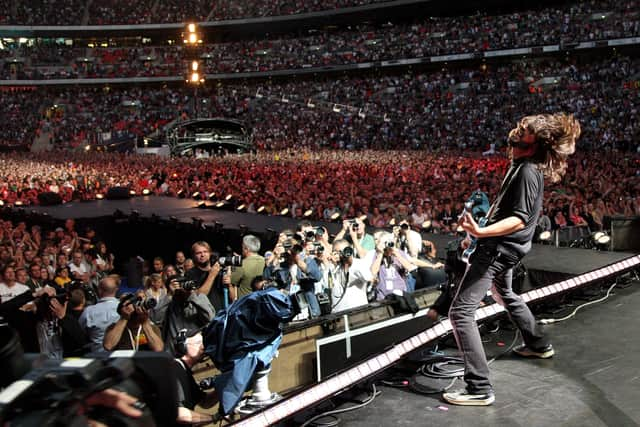Lviv-Aid: star-studded event looks to enlist U2, The Rolling Stones, and Pink for ‘Live Aid’ style event
People in this article


Rumours have been circulating over the weekend that plans for a large-scale ‘Live Aid’ style event are being planned for June 2023 in support of the continuing war in Ukraine. Though no one has been confirmed as of yet, some of the names include previous Live Aid alumni and a current chart-topper. The event is said to have its production helmed by ITV and Livewire Pictures, who were responsible for the March 2022 fundraiser, featuring performers including Ed Sheeran and Billie Eilish - that gig raised over £13 million.
There are some logistical problems with selecting artists, however, owing to the short notice for an event of this scale to be planned and with Glastonbury 2023 taking place around the rumoured event date. A number of artists have already signed on to be part of the influential festival.
Advertisement
Hide AdAdvertisement
Hide AdContractually, musicians selected for a music festival have to ensure they have no shows before their appearance, or shortly afterward, to avoid diluting a potential audience attending.
According to the Daily Mirror, those names being invited include U2, The Rolling Stones, The Killers and P!nk for the large-scale event, with plans to air the concert globally to not only raise money for Ukraine but to put more pressure on Vladimir Putin. No news yet if a charity single akin to ‘Do They Know It’s Christmas’ is set to be released in conjunction with the proposed concert.
But that hasn’t stopped The Killers, who will be set to perform at the Reading and Leeds Festival 2023 in August, to be one of the first names to be earmarked for a possible set. P!nk, who is undertaking a series of smaller headliner shows in the United Kingdom, has also not been confirmed for any summer festivals - while U2 have continuously been associated with these styles of shows, owing to their history with Live Aid, Live 8 and Live Earth previously.
With everything regarding this fundraising event still fluid and wheels in motion, PeopleWorld takes a look at some other large-scale events that took place at Wembley to raise proceeds and awareness of societal or political issues - and what organisers could learn from previous events.
Live Aid (1985)
Advertisement
Hide AdAdvertisement
Hide AdOften imitated, but never beaten - during a time in the ‘80s where, to quote Gordo Gecko, “greed is good”, Live Aid was set up to raise funds after Bob Geldof couldn’t shake seeing images of the Ethiopian famine happening at the time. He managed to bring together a rag-tag bunch of musicians - including a young U2, David Bowie and the now iconic performance by Queen.
It set the precedent for the large, global fundraising event but wasn’t without its critics; be it Phil Collins drumming for Led Zeppelin, Bob Geldof losing his temper on live television, or, in the words of Andy Kershaw, who co-hosted the television coverage of the event, “irritating, shallow, sanctimonious and self-satisfied [...], smug in its assumption that a bunch of largely lamentable rock and pop floozies was capable of making a difference, without tackling simultaneously underlying problems."
Lesson for organisers: Don’t book Phil Collins to drum with Led Zeppelin. Audiences also find sanctimonious rich people off-putting when it comes to charity.
Live 8 (2005)


Live 8 was a string of benefit concerts that took place on 2 July 2005, in the G8 states and South Africa. They were timed to precede the G8 conference and summit held at the Gleneagles Hotel in Auchterarder, Scotland, from 6–8 July 2005. Announced by Bob Geldof on May 31st, several original Live Aid performers offered their services once again, including Paul McCartney and U2.
Advertisement
Hide AdAdvertisement
Hide AdBut Bob Geldof’s dogged approach to activism was once again criticised, once again might we add by Andy Kershaw, who wrote “I am coming, reluctantly, to the conclusion that Live 8 is as much to do with Geldof showing off his ability to push around presidents and prime ministers as with pointing out the potential of Africa. Indeed, Geldof appears not to be interested in Africa’s strengths, only in an Africa on its knees.”
There was a level of cynicism also that the event was used by some musicians to re-ignite their musical careers, rather than show support for the causes Live 8 was extolling to viewers. Much like the dramas at the FIFA World Cup 2023 in Qatar too, there was a perceived double standard that regular attendees could not buy alcohol - but the champagne was flowing for VIPs.
A lack of diversity was also called out, as Mariah Carey and Blur/Gorillaz frontman Damon Albarn called the lack of black performers the organisers’ "greatest oversight", while Senegalese musician Baaba Maal wrote in The Independent: "I do feel it’s very patronising as an African artist that more of us aren’t involved."
Lesson for organisers: Less of Bob Geldof for promoting an event, more diversity. Also, if the general public can’t drink alcohol, why should special guests?
Live Earth (2007)


Advertisement
Hide AdAdvertisement
Hide AdLive Earth was a one-off event developed to combat climate change. The first series of benefit concerts were held on July 7, 2007. The concerts brought together more than 150 musical acts in twelve locations around the world which were broadcast to a mass global audience through television, radio, and streamed via the Internet.
While audiences did not get to see U2 make it a three-peat with a performance at the event, organisers must have taken notice of the lack of diversity criticisms from Live 8, bringing a diverse selection of performers including The Black Eyed Peas and Corrine Bailey Ray. However, there was still more criticism levied towards this event…
The biggest criticism came in the form of the environmental impact the event would have, despite the reason for the event to raise awareness for climate change. The event’s total carbon footprint, including the artists’ and spectators’ travel and energy consumption, was probably at least 74,500 tonnes, according to John Buckley of CarbonFootPrint.com - more than 3,000 times the average Briton’s annual footprint.
There was also a complaint regarding the financial transparency of the series of events. Intelligent Giving attempted to find out what happened to the proceeds from ticket sales at the concerts. Their conclusions, published in a feature "What on (Live) Earth is going on?" were that no one involved is capable of giving a clear answer.
Advertisement
Hide AdAdvertisement
Hide AdLessons for organisers: Have some financial transparency about where any proceeds would go. Try not to create a large carbon footprint - especially if your event is to bring up issues of climate change.
Comment Guidelines
National World encourages reader discussion on our stories. User feedback, insights and back-and-forth exchanges add a rich layer of context to reporting. Please review our Community Guidelines before commenting.
